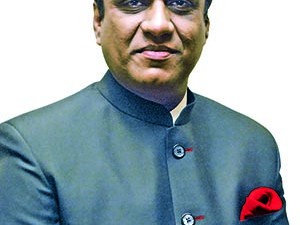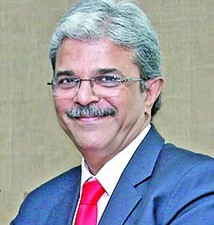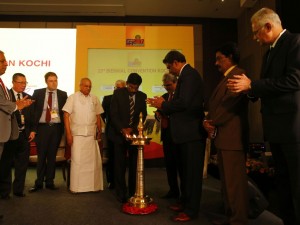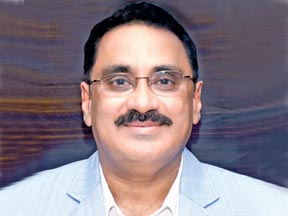At the FFFAI convention, Stanley Lim, Chairman, FIATA Congress Committee & Past President FIATA, expressed the need of logistics cost to be cut down. He said, “No matter in which industry you are, you need logistics and in logistics we are talking about from farm to fork and the number of steps and the cost involved. Moreover, for globalisation one needs to involve all government agencies in one platform to facilitate trade. Hence, logistics cost needs to be cut down to make country’s import and export competitive. Once the number of steps will get cut down, security will be enhanced and there will be less human error.”
Read More »Govt gung-ho about logistics industry, says Ashish Pednekar
The Federation of Freight Forwarders Association in India (FFFAI) convention showcased the role and efforts undertaken by the government to elevate the industry. Ashish Pednekar, Chairman Elect, FFFAI & Convenor Kochi Convention, highlighted how the government has been taking initiative optimally. “The government is bringing lot of changes in the Exim trade and FFFAI is the important link. Change is eminent and we have to be with the change to take the industry to the next level. Moreover, with initiatives like ‘Make in India’ logistics has a very important role to play. Most importantly, now government has realised the significance of logistics industry and started taking the fraternity suggestions seriously,” he said.
Read More »Uplift next gen to become logistician: Shankar Shinde
While enumerating the necessity of skill required in the field of logistics, Shankar Shinde, Vice Chairman, FFFAI, opined at the 23rd convention of the Federation of Freight Forwarders Association in India (FFFAI): “We always try to convert challenges into opportunities. One of the most important challenge is skill. We are trying to focus onto skill development through this convention. Hence, we are looking for training and adapting international practices for better upliftment. Our idea is to make logistics as a choice of first profession. For the next generation, the decision to become a logistician should not come by default, but, by choice.”
Read More »Skill necessary in logistics, says Chairman, FFFAI
The FFFAI convention held in Kochi, saw eminent industry persons come and deliberate on crucial elements of the logistics sector. Highlighting the same, Samir J Shah, Chairman, FFFAI, said, “We are working on three important issues. One of the most important issues we are targeting is skill; we understand with technology, domain knowledge of the broker is going to become important. Secondly, our focus is on gender equalisation and thirdly, we are creating a platform where FFFAI member can adopt the changes that are coming in the future. The Indian custom broker is capable of doing everything. Hence, any importer or exporter does not need to go to anybody else; the entire supply chain will be looked after by them.”
Read More »FFFAI convention begins in Kochi
The 23rd convention of the Federation of Freight Forwarders Association in India (FFFAI) was inaugurated on January 19, 2017, in the august presence of Venkatesh, Eminent Economist, William Demoor, Chief of Cabinet of Chairman, Port of Antwerp, Stanley Lim, Chairman, FIATA Congress Committee and Past President FIATA, V.J. Mathew, Legal Advisor to the Government of Kerala, Senior Advocate of High Court of Kerala, K.V. Thomas, PAC Chairman, MP, Erankulam, along with the logistics fraternity, in Kochi. The convention aims to build a platform for enhancing the logistics sector as a whole while highlighting necessary issues like skill development, supply chain, gender equalisation, among others.
Read More »Airports need refurbishment: Rahat Cargo
“It is call of the time that the Finance Minister takes suitable steps to refurbish and revive the airports which still lack the infrastructural support to their users. Efforts must also be made to increase the regional connectivity by roads by providing highways to achieve an accelerated reach between the manufacturing unit and the transporting carrier. Further, abolition of complex policies, aggressive price cuts and multi-tiered tax system are vital followed by introduction of GST,” wishes Sunil Kohli, Managing Director, Rahat Cargo. “Entrepreneurs should be encouraged for ‘ease of doing business’ and focus should also be made towards introducing a single independent authority to facilitate ‘Digital India’ and ‘Make in India’ implementation. It is also expected from the FM to undo the tedious documentation process and bring in the methods to do away with paper work and switch to the digital mode instead,” Kohli persist. The logistics industry is highly fuel intensive and its operating cost is largely dependent on the petroleum prices hence a liberal taxation may be considered on such products. To promote a larger quantum of exports, the FM should also consider an enhanced incentive or fiscal concessions to the exporters.
Read More »A fair GST will help reduce logistics cost: Abhijeet Logistics
“The proposed Goods and Services tax (GST) will help companies reduce logistics cost by 1.5-2.5 per cent as they reconfigure their supply chains and bring in three key structural changes to the logistics industry. First, as India becomes one big market, there will be fewer and larger warehouses. Second, it will lead to a larger number of bigger trucks on road as there is greater adoption of the hub-and-spoke model. Third, these changes will lead to greater economies of scale for transport operators. Hence, more companies will outsource their logistics operations,” explains Abhijeet Verma, MD & CEO, Abhijeet Logistics. Eliminating delays at check posts will yield an additional savings of 0.4-0.8 per cent of sales. When implemented, this tax will free the decisions on warehousing and distribution from tax considerations and here the technology will play its role in tracking of consignments, managing complete hub and spoke model, centralised accounting, managing warehouses effectively as warehouses will be fewer but larger, and most importantly this will result in more efficient cross-state transportation with improvement in transit time.
Read More »Quick implementation of NCAP measures: AISATS
“As National Civil Aviation Policy (NCAP) is reaching its final stages, we look forward to faster implementation of the measures outlined in the policy which will give an overall boost to the aviation industry. As India requires more operational airports, to meet the ever increasing demand of passenger and cargo, we await announcements on development or rehabilitation of airports to benefit domestic and international trade,” says Mike Chew, CEO, AISATS. “Indian airports serve as a transfer hub for various intercontinental routes such as Europe – Australia and Europe – South East Asia. But the transshipment route has not been explored to its full potential. This is a disadvantage when competing in the global market and impedes the capture of intercontinental traffic. Also as the consumers are becoming more discerning, on time delivery of goods has gained much more importance than ever before. As mentioned in the draft policy, we would expect shaping up of few steps such as setting up of Free Trade and Warehousing Zones to facilitate transshipment cargo and expediting development of necessary infrastructure for Express Delivery Services (EDS) to cope up with double digit growth in e-commerce,” he continues. “As air cargo is the barometer for country’s economic health, we expect that the upcoming Union Budget 2017-18 to have provisions to accommodate decisions on few key elements such as infrastructure status to cargo facilities, tax benefits to air cargo operators and freight forwarders, incentives on capex for developing cargo handling facilities, streamlining and simplifying of custom procedures, shifting to paper-less air cargo, allocation of more space for cargo at the airports, availability of all relevant central government authorities through a single window at the cargo terminals, 24×7 …
Read More »Expectations from Budget 2017-18
With another Budget approaching, the industry has many hopes and demands from the government. CargoTalk talks to industry veterans to know their wish list. The government will present the Union Budget 2017-18 on February 1 for the financial year starting on April 1
Read More »Budget 2017-18 can make a big difference
Rajesh Neelakanta, ED & CEO, BVC Logistics, expects removal of service tax and GST later on warehouse rental charges. Tax sops for setting up warehouse infrastructure in semi-urban and rural areas on NA plots is anticipated. “Better depreciation benefits for capex spend in warehouses, including for the construction and installation of equipment including material handling equipment,” requests Neelakanta. “Skill India programme needs to be addressed on a war-footing by way of sops to the training and skill development organisations to continue their training programme and motivate others to join in the logistics and supply chain industry,” he suggests. Not to forget, fuel costs is a major component of operating costs in the logistics industry. A rational levy of duties/taxes is the need of the hour. Private ports’ tariff structures – are not supporting industry growth owing to a much higher tariff in relation of Major ports. Expectation is to bring these under TAMP. This will help in reducing the logistics transaction costs.
Read More » Cargo Breaking News
Cargo Breaking News









